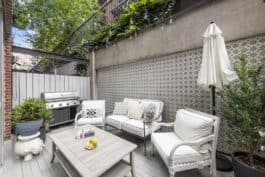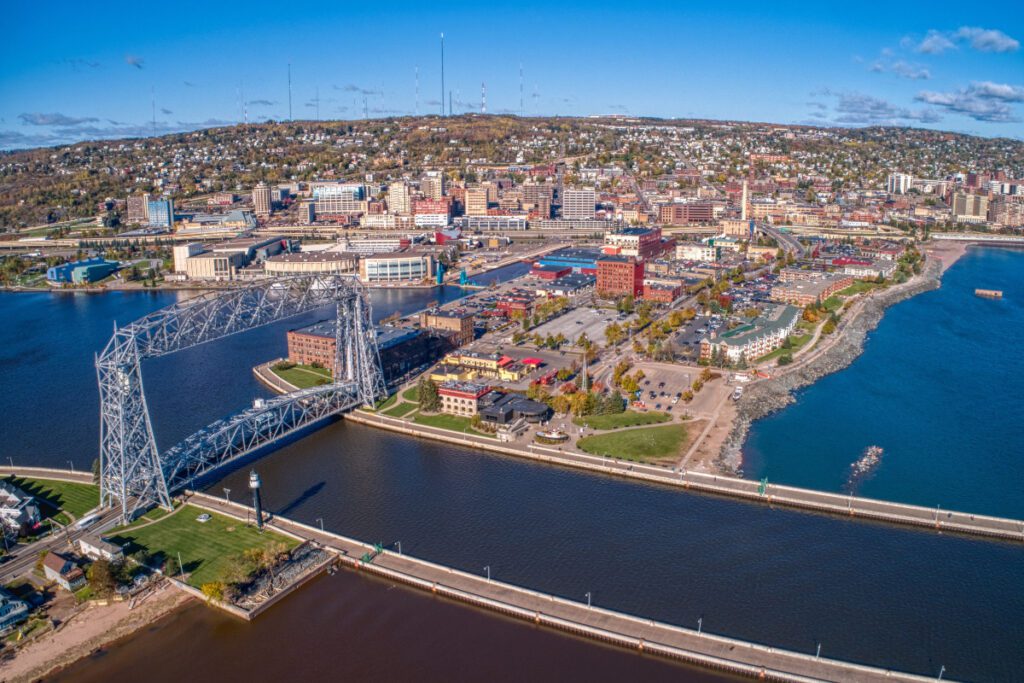Austin is an ever-growing, popular city that attracts renters from all over the country. These are the best apartments in Austin offering renters a place to suit their needs — whether you are looking for access to nature, city suites or anything in between.
Check out the best apartments in Austin from our handy list below.
Photo source: Agave Falls Apartments / Rent.
Quaint exteriors and colorful interiors typify the Agave Falls Apartments. The one- and two-bedroom units have an optional decorative backsplash and under-market rents in East Austin. The community has two pools, high-speed internet access and a playground. Oh, and of course, there is a pet park, too.
Agave Falls even helps residents with their finances thanks to their innovative credit-building program.
Photo source: Oak Crest / Rent.
Oak Crest offers a unique alternative to classic apartment living. The three- and four-bedroom detached units each have their own yards, no shared walls and private decks and patios.
The community includes luxurious landscaping, extra storage and a washer and dryer in every unit. Pets and children can play thanks to the yard space, playground and swimming pool.
Photo source: Creekside on Parmer Lane / Rent.
Creekside on Parmer Lane has one-, two- and three-bedroom units in far Northeast Austin. The brand new, resort-inspired community has electric vehicle charging stations, curtained cabanas, USB port wall outlets and washers and dryers in every unit.
Additionally, amenities include kitchen islands/bars, a fire pit conversation area, a climate-controlled pet spa and quartz countertops.
Photo source: Avanti Hills / Rent.
In the gorgeous and hilly Bee Cave community, Avanti Hills has one- and two-bedroom floorplans stacked with amenities. Like most Austin complexes, the apartment includes two pools, a Zen garden, a billiards table and business and conference centers.
With each unit, residents benefit from a private parking garage, ceiling fans in each room, island kitchens and granite countertops.
Photo source: Bridge at Asher / Rent.
The Bridge at Asher has one-, two- and three-bedroom units with vaulted ceilings, fireplaces, oversized closets and garden tubs. Units include a carport and access to a pet park, fitness center, business center and swimming pool.
Residents can also take in hill country views from their large patios or balconies.
Photo source: The Catherine/Rent.
Located in the heart of Austin with spectacular city views, the Catherine has one-, two- and three-bedroom units. The luxury apartments offer a wide variety of floor plans with vaulted ceilings, oversized closets, extra-large balconies and hardwood floors.
Residents benefit from controlled building access, a large fitness center and full concierge service.
Photo source: The Park at Wells Branch / Rent.
Stay connected in multiple ways with The Park at Wells Branch’s fiber internet and public transportation access. This green community also has a pet park, hiking, biking and jogging trails and picnic areas with grills.
Inside the one- and two-bedroom units, residents will find spacious closets, hardwood floors and a fireplace. Other amenities include basketball courts, a media center, a hot tub, a fitness center and a swimming pool.
Photo source: Eagles Landing / Rent.
Spacious one-, two- and three-bedroom floor plans leave room for the whole family at Eagles Landing. This income-restricted community also offers a free after-school program and free summer camp.
Eagles Landing accepts vouchers and provides special cable rates and packages. They offer all of this on top of under-market rent prices.
Photo source: 620 Canyon Creek / Rent.
Families with children will love 620 Canyon Creek thanks to the excellent surrounding schools in Leander Independent School District and the easy access to Lake Travis. Canyon Creek is a green community with a recreation center, fitness center, swimming pool, hot tub and tennis courts.
The one-, two-, three- and four-bedroom units also have several luxury upgrades available, including customized mantels, direct access garages, Italian marble entryways, wood-burning fireplaces and jetted Roman tubs.
Photo source: Axis West Campus / Rent.
Less than a mile from the University of Texas’s most popular hangout, The Drag, Axis West Campus provides one-, two-, three- and four-bedroom apartments at an affordable price.
Residents have access to tanning beds, a media and gaming area, a Starbucks machine and an outdoor fire pit and entertaining area. The community also provides independent living units and disability accessibility too.
Photo source: Anthem at Ledge Stone / Rent.
Conveniently situated with access to the city but also in spacious Central Texas hill country, Anthem at Ledge Stone offers rustic style meets luxury living. This community has electric vehicle charging stations, a pet spa, a resort pool with private cabanas, a fire pit and social grills.
Inside the one-, two- and three-bedroom units, residents enjoy renovated interiors, island kitchens, stainless steel appliances, dimmable pendant lighting and vaulted ceilings in select units. All in all, it’s got everything you could need.
Photo source: West Gate Ridge Apartments / Rent.
Classically appealing with well-below average rent, West Gate Ridge provides standard amenities in Southwest Austin. The pet-friendly one- and two-bedroom units include disability access and spacious interiors.
All units have a private balcony or patio and washer/dryer connections. Residents also enjoy a playground, fitness center, swimming pool and business center.
Photo source: Collective on Riverside / Rent.
The Collective on Riverside is an excellent option for students. These one-, two-, three- and four-bedroom apartments have fully furnished options.
Students can also easily commute to school using public transportation or the university shuttle service that stops on-site. When not studying or working, Collective residents enjoy access to a variety of athletic facilities and bocce, shuffleboard and billiards.
Photo source: Southpark Crossing / Facebook
Live in style at Southpark Crossing. The one- and two-bedroom apartments feature nine- to 11-foot ceilings, crown molding, island kitchens and granite counters in the kitchen and bathrooms. Residents also benefit from extra storage in full-size pantries, oversized closets and balcony storage.
Enjoy the additional uncommon apartment luxuries of Nest Wi-Fi thermostats and an on-site movie theater with reclining seats.
Photo source: River Ranch / Rent.
Growing families will fit right in at River Ranch in Northeast Austin. The apartments also boast a community playground and splash pad. Fur babies can enjoy the dog park while parents will appreciate the fitness center.
Entertaining friends is also a breeze with the spacious clubhouse and community center that includes a fully-equipped kitchen.
Photo source: Bridge at Cameron / Rent.
The Bridge at Cameron is a brand-new community in Northeast Austin.
These one-, two- and three-bedroom, income-restricted apartments include programmable thermostats and extra storage. The smoke-free, green community also has an on-site technology center.
Residents can also enjoy the community room with a patio area, carpeted bedrooms and laundry facility.
Photo source: Hills at Leander / Rent.
The Hills at Leander offers private, quiet, comfortable living for seniors in Austin’s Cedar Park neighborhood. These income-restricted units enable independent living for seniors, including disability access, game rooms and group exercise.
Residents can also welcome visits from family and friends thanks to guest parking and an on-site picnic area with barbecues.
Photo source: Estates at Austin / Rent.
The Estates at Austin in Pleasant Valley is perfect for University of Texas students with five-, 10- and 12-month leases at half of the average city rent. This community also has a covered UT shuttle station that provides service directly to the university.
The one-, two-, three- and four-bedroom, disability-accessible units also include high-speed internet with included HBO. Students can work and play thanks to the 24-hour private study nooks and computer lab alongside basketball, tennis and sand volleyball courts.
Photo source: Scofield Park / Rent.
Offering luxury, affordable apartments in far North Austin, Scofield Park has all the amenities to keep residents connected and entertained. Residents can enjoy an internet cafe with a media center, an entertainment lounge and two 24-hour fitness centers. Even pups can stay busy with two on-site bark parks with agility courses.
This complex with one-, two- and three-bedroom apartments is also just minutes away from the Domain, a popular shopping center and local hot spot.
Photo source: Menchaca Commons/ Rent.
Spacious and affordable, Menchaca Commons has outdoor patios and a grilling area. Renters will also save money thanks to the energy-efficient appliances and LED lighting in every unit.
This green community also has Amazon package lockers and hardwood flooring on top of renovated interiors and ceiling fans in every room.
Photo source: Tintara at Canyon Creek / Rent.
Just minutes away from Lake Travis, Tintara at Canyon Creek has one-, two- and three-bedroom units. On top of affordable rent, Tintara offers hardwood floors, island kitchens and vaulted ceilings.
Renters also benefit from a private gated entry and the option to utilize a business conference center and boutique office space.
Photo source: Monterey Ranch / Rent.
Athletes of all types will feel at home in Monterey Ranch. In addition to a well-equipped fitness center and rec room, these apartments have a range of sports facilities, including a soccer field, basketball court, tennis courts, biking, hiking and running trails and five pools.
A selection of the studio, one-, two- and three-bedroom floorplans at Monterey Ranch are also ADA accessible.
Photo source: The Mansions at Onion Creek / Rent.
Enjoy all that South Austin has to offer from the Mansions at Onion Creek. These one-, two-, three- and four-bedroom units live up to their name, ranging from just over 700 to nearly 2,000 square feet.
Last but not least, the Mansions has an Olympic-sized infinity pool
Photo source: Barton Creek Villas / Rent.
Tucked into the hilly idyll of Barton Creek in West Austin, Barton Creek Villas has fantastic views thanks to its spacious open floor plans and oversized windows.
Outdoor enthusiasts will appreciate its bike and hiking trails while their pet companions will enjoy the on-site bark park with an agility course.
The community offers luxury one-, two- and three-bedroom units, plus a clubhouse with a coffee bar.
Photo source: Pioneer Hill / Rent.
Perfect for professionals that may work at the nearby companies in Northeast Austin, Pioneer Hill offers great prices and amenities for one-, two- and three-bedroom units — no wonder it’s one of the best apartments in Austin. Every apartment comes with a yard or a balcony and stylish modern interiors.
Residents also enjoy the option of full-size washer-dryer connections, extra storage and a community clubhouse.
The best apartments in Austin
Wherever you choose to live, Austin offers apartments that suit any lifestyle. Find apartments for rent in Austin today.
We looked at all available multifamily rental property inventory from January to June 2021 on Rent. to determine which properties with an Austin mailing address are most viewed by organic internet searches. The information included in this article is used for illustrative purposes only. The data contained herein does not constitute financial advice, availability or a pricing guarantee for any apartment.
Source: rent.com

